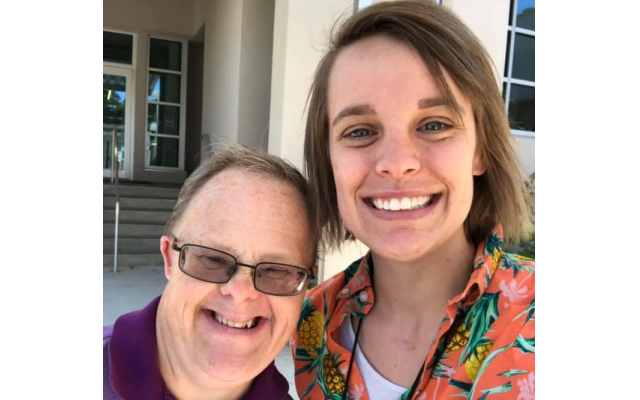JAA to Survey Disabilities Community
Jewish Atlanta held programs to encourage inclusion, capping off Jewish Disability Awareness, Acceptance and Inclusion Month in February.
On March 1, the Jewish Abilities Alliance of Atlanta held its Power of a Program to celebrate the inclusion of people with disabilities into the Atlanta Jewish community. The program, which is five years old, capped off Atlanta’s celebration of Jewish Disability Awareness, Acceptance and Inclusion Month in February.
Several disability inclusion events were held throughout Atlanta in February, including Inclusion Shabbats in many synagogues. And, this month, from March 12-22, Jerry’s Habima Theatre, the theatrical company directed and produced by industry professionals, featuring actors with special needs as well as professional community actors, is producing “Mamma Mia!” This is the 27th musical produced by the theater at the Marcus JCC.
Since JDAIM was launched in 2009 to bring Jewish agencies, schools and synagogues together in a united effort to raise awareness and champion the rights of individuals with disabilities, a lot has changed. That includes adding the words “acceptance” and “inclusion” to its title.
In 2013, the Jewish Federation of Greater Atlanta officially launched JAA with the mission to “support the community’s inclusion work,” said JAA manager Annie Garrett, who started in May 2018.
“We want to make the Jewish community more welcoming to those with disabilities,” Garrett said. She explained that JAA doesn’t provide direct support to individuals, but rather supports Jewish agencies that directly serve those with disabilities.
For example, at Jewish Family & Career Services, there’s an adult day care program that currently serves 54 adults with disabilities, including Down syndrome, cerebral palsy, autism and some physical disabilities.
“The age range is 22 to 67,” said Abby Frantz, community access program manager for JF&CS’s developmental disabilities services. With a staff of 20, the program offers outings every weekday.
Frantz plans to grow the program gradually, adding about 10 clients a year. “We want the staff to get to know each client, so we don’t want them (to join) all at once.” She also plans, in the next year, to raise her profile, “to listen to the Jewish community and hear what’s needed. I want to learn what programming would excite the community.”
At the same time, JAA plans an assessment program to “research the entire lifespan” of the disability community, Garrett said. “It will be a big undertaking. Our priority will be the adult level. Older adults have not been as engaged in the Atlanta Jewish community.”
In fact, the Atlanta Jewish community previously supported a centralized special education agency for youth. But the Amit Program closed in June 2013 after serving hundreds of Jewish students in various programs since 2001.
The creation of JAA meant that Jewish Atlanta decided to focus on the broader disabilities’ community, and not just young people.
Garrett notes that one in every five Jewish Americans – the same ratio as in the larger American population –– has a disability. Including siblings, parents, other family members and friends, the vast majority of Jews are impacted by someone with a disability.
Garrett uses statistics provided by RespectAbility, a national nonprofit organization that fights stigmas and advances opportunities for people with disabilities. The president of RespectAbility is Jennifer Laszlo Mizrachi, a graduate of Emory University.
About 1 ½ years ago, RespectAbility conducted a Jewish disability inclusion survey. The biggest takeaways from that survey were the lack of people with disabilities in leadership roles as clergy or staff at Jewish institutions, and a feeling of unwelcomeness to serve as lay leaders in the Jewish community. The report noted that only 15 percent of Jews with disabilities knew of a person with a disability in a leadership role, while fewer than 10 percent of Jews without a disability connection knew of a leader with a disability. “If you see it, you can be it, and today Jews with disabilities need more role models with disabilities in leadership in the Jewish community,” Mizrachi said at the time. “Many also want to be recruited, trained and empowered to make the Jewish community stronger, just like anyone else.”
RespectAbility’s national survey was funded by Genesis Prize Foundation, whose president, Steve Rakitt, formerly headed the Atlanta Federation. He suggested that “the fact that most respondents cannot name a Jewish leader with a disability simply highlights that many disabilities are not visibly evident. By modeling openness and candor, we can change the perception that being a Jewish leader and being a person with a disability are not mutually exclusive.”
Another former employee of the Federation is Eric E. Jacobson, now executive director of the Georgia Council on Developmental Disabilities. “Still active with the Jewish Abilities Alliance,” Jacobson said his federally funded, independent state agency convenes organizations that work with individuals and families living with intellectual and developmental disabilities in Georgia. Recently this included members of the Atlanta Jewish community for its annual GCDD Advocacy Day to talk with legislators.
In 2015, the Georgia Council surveyed people across the state to determine the needs in the disability community that weren’t being answered. The result was a five-year plan for 2017 to 2021 to address those needs across the state.
It’s been 30 years since the Americans with Disabilities Act, or ADA, was passed. Since this civil rights law that prohibits discrimination based on disability went into effect, much has changed for the disability community. “Thirty or 40 years ago, those diagnosed with disabilities were sent to programs designed only for those with disabilities,” Garrett said. “There’s been a movement since then to pull people out of isolation” and into the community.
Having grown up with a mother who worked in the disability realm as a special education teacher, Frantz said she’s “really excited to see so many in the Jewish community embrace inclusion.” After all, she stressed, “inclusion is not a special need. It’s not just for those with developmental disabilities. As human beings, we all want to be included.”




comments